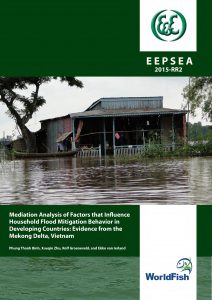By Phung Thanh Binh, Xueqin Zhu, Rolf Groeneveld and Ekko van Ierland
Summary: This study used the Protection Motivation Theory and mediation analysis to investigate mitigation behavior in response to flood hazards. A household survey and a flood-risk communication experiment with 480 households in selected flood-prone areas in Vietnam’s Mekong Delta were conducted. The results indicated that self-efficacy (i.e., one’s ability to take actions that will reduce flood risks) and response efficacy (i.e., the effectiveness of the action to be undertaken) were consistently good predictors of flood mitigation behavior and important mediators in the relationships between mitigation behavior and its individual determinants. Vicarious experiences from flood-risk training programs and focus group discussions increased people’s motivation to undertake protective action. The effect of focus group discussions on mitigation behavior was fully mediated via self-efficacy and response efficacy while the effect of training was partially mediated via response efficacy. In addition, the indirect effects of most of the independent variables were statistically significant. This implies that ignorance or omission of indirect effects could lead to an incorrect explanation of the factors that influence flood mitigation behavior.
Research Report: Download
Country: Vietnam
Publication Year: 2015
Research Areas: Climate Change
Research Topic: Migration
Analytical Framework: Behavioral/ Experimental Economics

